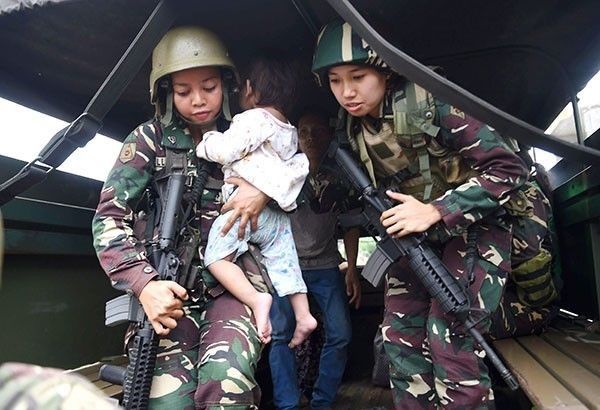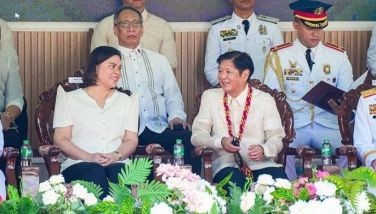A look at the new law on protecting children during armed conflict

MANILA, Philippines — Rights group Save the Children hailed the signing of Republic Act 11188 or the Special Protection for Children in Situations of Armed Conflict Act.
Lawyer Albert Muyot, Save the Children Philippines chief executive officer, stressed that war leaves permanent scars, especially on thousands of children living through armed conflict.
“We hope this law will institutionalize protection and humanitarian assistance to children trapped in armed conflict areas,” he added in a statement.
President Rodrigo Duterte signed RA 11188 into law on January 10, but the signing was made public only on Tuesday.
READ: Children in conflict-affected Mindanao areas continue to suffer deaths, injury — group
Here are some of its salient points:
Recognition of rights of children in situations of armed conflict
The law provides a definition for “children affected by armed conflict,” “children involved in armed conflict,” and “children in situations of armed conflict.”
Children in situations of armed conflict are assured of the following rights:
- Right to life, survival and development
- Right of special respect and protection against any form of abuse, neglect, exploitation and violation
- Right to be treated as victims
- Right to be accorded with special respect and to be protected from any form of direct or indiscriminate attacks and acts of violence
- Right to be protected from recruitment into government forces or armed groups and from participation in armed conflict
- Right to be protected from maiming, torture, abduction, rape and killing, especially extrajudicial killing
- Right to be immediately provided and have safe access to essential, adequate and culturally appropriate clothing; water, sanitation and hygiene; basic health services; education; early childhood care and development programs
- Right to enjoy their freedom of thought, conscience, religion or belief, opinion and expression
- Right to be treated humanely in all circumstances
- Right not to be interned or confined in camp
- Right of the injured, the wounded and the sick
- Right to be with their families, and to be reunited with their families, in case if separation due to armed conflict
- Right to privacy and confidentiality in all proceedings
- Right to non-discrimination
- Right to liberty of movement and freedom to choose their residence
- Right to leave the country
- Right to obtain necessary documents to enjoy their legal rights and of access to justice
- Right to the protection of their family’s properties and possessions
- Right to be consulted and to participate in all matters affecting them
Zones of peace
Chapter II of RA 11188 provides that children are declared as Zones of Peace, and would be treated in accordance with what is stipulated in Republic Act 7610 on special protection against child abuse, exploitation and discrimination.
Under RA 7610, children “shall not be the object of the attack and shall be entitled to special respect,” and would not be recruited to become members of the Armed Forces of the Philippines or other armed groups.
RA 11188 mandates the State and all sectors to “resolve armed conflict in order to promote the goal of children as Zones of Peace.”
“As such, the community, governmental authority and, if appropriate, religious leadership shall preserve the peaceful integrity of children, exemplify mutual respect and nonviolent behavior in the presence of children, share their resources to further peace and cooperation,” the law further states.
Sen. Risa Hontiveros said this specific provision of the law “makes the country more compliant with international obligations for the increased safety and well-being of children.”
Harsher penalties against offenders
The law also imposes harsher penalties on anyone found guilty of killing, torturing, maiming and raping children and those who would subject them to inhuman and degrading treatment.
Any person found guilty of the said four violations would face life imprisonment and be fined from P2 million to P5 million.
The law also listed acts that would fall under grave child rights violations where violators would face imprisonment from 14 to 20 years and be fined from P1 million to P2 million. — Kristine Joy Patag
- Latest
- Trending




























